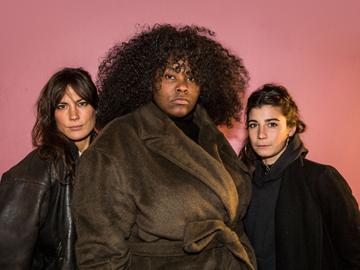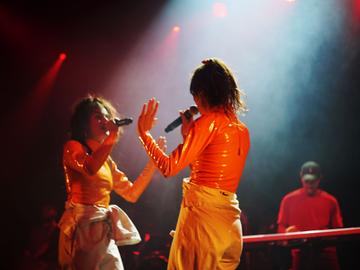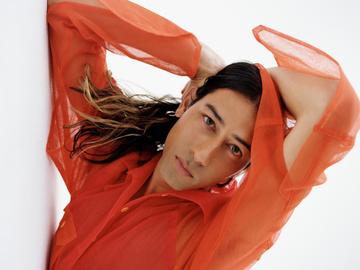On the debut album of their sharp flavoured alliance Juicy, Julie Rens and Sasha Vovk ask themselves “What is the essence of being human?” With a tantalising hybrid of R&B, pop, metal and classical music, they are bracing themselves for the end of days.
© Benjamin Vigliotta
| Sasha Vovk and Julie Rens (right)
"Don't you dare go out / Take shelter,” Juicy sings in “Bug In”, a song from their debut album Mobile that throws electro, rap, metal and an ominous piano into the concrete mixer with plenty of drama. Julie Rens and Sasha Vovk wrote the song two years ago, in the summer of 2019. The two Brussels women have turned out to be prophetic souls because, in the wake of the Covid crisis and face-to-face with a horrible war a few hours east of us, the lyrics have taken on a new Doomsday dimension.
The “Teotwawki” to which the duo refers in “Bug In” sounds like a Mayan deity announcing the end of the world (which, according to the Central American people, should have happened ten years ago!), and that is not far off: the acronym stands for “the end of the world as we know it.”
“Haha, yes, that word popped up on our radar when we got into the subject of survivalists, people preparing for the apocalypse,” explains Julie Rens. “Thanks to them, we have discovered a whole new vocabulary. Survivalists, or preppers, are people who take cover. Who literally build bunkers and shelters to survive the end of time. Admittedly, we never thought that this theme would end up being so topical now.”
Should we follow their example, stock up on food and fuel and buy emergency generators? It doesn't sound as mad as it did a few years ago. When the levees break thanks to global warming, a virus turns us into zombies or Putin presses the red button, survivalists will ensure that humanity is not wiped out. Hurrah!
“We all found it very fascinating, but we refuse to the future that way,” says Rens. She refers to the song “Common Future”, in which the pair sketch how they believe in a future where we understand each other, join forces and eliminate all the things that hinder us and drive us apart. “We asked ourselves the question, what do we want to keep when we are effectively nearing the end of time? What is the essence of being human? What is beauty? What truths do we carry? What values do we want to pass on to our children? How do we preserve our naivety?”
We are women of thirty in 2022, we don’t do small-talk. We want to make people aware of what is happening around them, to inform themselves and not be docile
Juicy makes juicy but sharp flavoured music, a metropolitan hybrid of pop, R&B, rock and classical and everything in between. Behind the shiny façade is a sharp tongue and a great deal of commitment. In recent years, Rens and Vovk have made a name for themselves with songs in which men are involuntarily discharged from their wiener under the guise of “ovary power”, they had an argument with former Secretary of State for Asylum and Migration Theo Francken (N-VA) when they called him an asshole during live shows, and they got involved in Bezet La Monnaie Occupée, a collective demanding better treatment of the cultural sector during the Covid crisis.
“We are women of thirty in 2022, we don't do small-talk,” says Rens. “We want to make people aware of what is happening around them, to inform themselves and not be docile, take a critical look at things and not just accept them as they are. You have to question them and take action against the wrongs of this world. There are so many things left to fight for.” People are dozing off, she says, like we lull our children to sleep with a mobile above their cradle – which is how their album got its name. We are numbed by TV, by social media, by the consumer society. “We do not plead innocent ourselves and we also realise that you have to discuss a great deal and listen to others. Nothing is black and white.”
Because of their fierce lyrics and outspoken opinions, Rens and Vovk are sometimes dismissed as today's riot grrrls, referring to the feminist subculture that coloured grunge in the early 1990s. Is that laziness? “You can call us feminists,” says Rens, “but actually that's a fight nobody should have to fight anymore. By 2022, everyone should be a feminist.”
And yet there is still a lot of work, says Vovk. She quotes the song “Youth”: “Women are too easily judged by their age. Our bodies are constantly being valued, as if you can't perform with a few wrinkles on your body.” In “Treffles”, Rens and Vovk, accompanied by a pimped-up version of themselves, expose social media that only serve to increase the fixation on beauty and perfection. “We seem to be more and more fixated on youth, and that puts a lot of pressure on people.”

© Elise Dervichian
| Julie Rens (left) and Sasha Vovk: “Often, passionate crimes are romanticised. We have to stop doing that. There is nothing romantic about femicide.”
In “Love When It's Getting Bad”, Rens and Vovk explore the line between all-consuming love and ruthless violence. “Often, passionate crimes are romanticised,” says Rens. “We have to stop doing that. There is nothing romantic about femicide.” She refers to the death of Marie Trintignant, the French actress who was murdered in 2003 by her boyfriend, Bertrand Cantat, the frontman of the French rock group Noir Désir. The song “Truth” ties in with this: does the truth change when you look at it from different angles? “Cantat was convicted and served his time in prison. Is he entitled to be reintegrated into society? That is a difficult discussion.”
“A song is not an in-depth article,” Rens suggested in a previous conversation, at the end of 2019. “You have to be very careful about the words you use, because before you know it, you are forced to take them back or face being pilloried.” She still stands by that thought, nuancing in a handful of verses is not easy. “We worked really hard on the lyrics. It is actually the discussions beforehand and the road we go down on a particular subject that are the most interesting.”
Julie Rens and Sasha Vovk met each other at the conservatory in Brussels, where they both studied jazz. About seven years ago, they were asked to do an intervention together for an exhibition. They decided to cover some of the songs they danced to as teenagers. When they started to learn the lyrics of those 1990s R&B and rap songs, they realised that those songs were pretty horrid about women, that they often portrayed women as sex objects. “We saw the fun in it,” says Vovk. “By singing them ourselves, we gave them a new meaning.”
Do they want people to dance to their own music, or take something from it? “Both,” laughs Rens. “The advantage of music is that you can address heavy themes in a light way,” Vovk nods. “You go crazy on the dance floor and learn something at the same time.”
It is remarkable how in tune Rens and Vovk are with each other. They complement each other's responses, share the same kind of humour, combine a worldly outlook with childlike naivety and are both musical multitalents. They call themselves “a mutant entity with two heads”. “We have been working together for about a decade. Year after year we appreciate each other more and more,” says Vovk. “We have the same taste, have long discussions on different subjects and try to make as few concessions as possible. We are one brain with four arms.” (Laughs)
This fusion is also present in their polyphonic music. Rens and Vovk both had classical training on the piano; the jazz training they followed afterwards merged with their love of hip hop and R&B. They are not averse to experimentation. At Dour, they once performed with thirteen horns. During the Covid pandemic, their music took a new turn: out of necessity, they stripped their songs down to their essence and learned to play à quatre mains.
“The deserted music academies became our salvation,” laughs Rens. They asked her father, Jean-Marie Rens, a professor of musical analysis, to write arrangements for strings and flutes for a concert with an orchestra. They took all that along when making their debut album; the mainly electronic pulses from their previous EPs were given an acoustic grounding with orchestral keys. Songs like “You Don't Have to Know” or “Fall Asleep” have no electronics at all.
“My father is a bit of an intellectual,” says Rens. Whether they are considering Siamese triplets? “At first he didn't like what we were doing, but now we see where we can complement each other. He worked like crazy to help us. If it were up to him, we would soon be performing with a philharmonic orchestra.” (Laughs)
JUICY: MOBILE
Release: 18/3 (Capitane Records)
25/3, 20.00, Ancienne Belgique, www.abconcerts.be
Read more about: Muziek , Juicy , julie rens , sasha vovk



